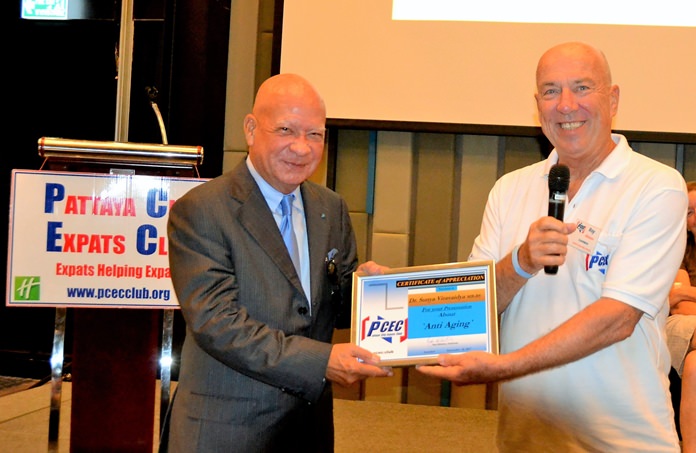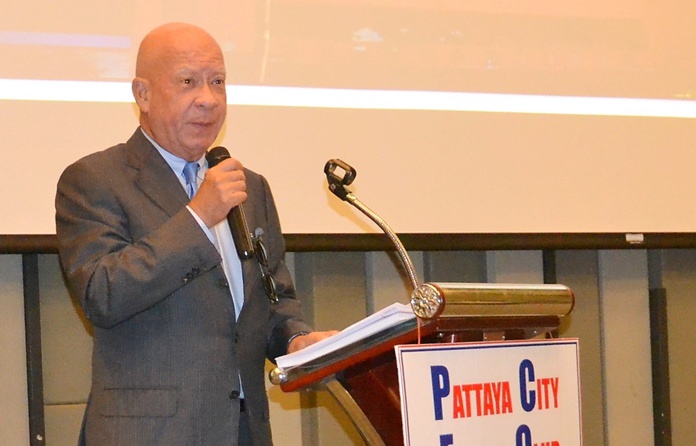
The Pattaya City Expats Club was honored to have a special guest speaker at their September 10 meeting. Dr. Sunya Viravaidya, Chairman and CEO of Pattaya International Hospital (PIH), gave a presentation on anti-aging and treatment for chronic pain.
Dr. Sunya was born in Thailand to a Scottish mother and a Thai father, both of whom were doctors. He graduated from the University of Melbourne, Australia, in 1970, did his internship at the Austin Hospital, Melbourne and his residency training in the Department of Medicine, Ramathibodi University Hospital in Bangkok. He founded Pattaya International as a clinic in 1974, then opened Pattaya International Hospital (PIH) in 1992.

He pointed out that PIH, an 80-inpatient bed hospital, is the second largest private hospital in Pattaya. It has the very latest Intensive Care facility and a full range of advanced facilities, including Obstetrics, X-ray, Laboratory, Pharmacy, Dental, 2 fully-equipped Operating Theatres, a Physical Therapy Center, and a Dermatology & Cosmetic Center. Dr. Sunya limited his talk to two specific topics, the Intravenous Bio-Laser and the latest testing of the diabetes drug, Metformin, as it relates to Anti-Aging.
Dr. Sunya is an advocate for learning by observing results, rather than simply reading or studying from texts. His first-hand results-related success with the use of a low-power laser, called a Bio-laser, to treat chronic pain and other acute diseases is such an example. He reports excellent results with the process he learned from a doctor in Taiwan.
Dr. Tien Y. Chuang, Professor and Chief of Physical Medicine, at the Veteran’s Hospital, Taipei Taiwan, demonstrated the effectiveness of “Bio-Laser Treatment” in patients whose lives were dramatically changed for the better. After observing the results, Dr. Sunya brought the machine back to be the first in Thailand.
This “low-wattage, intravenous laser” provides a completely new method in delivering treatment for pain and other acute diseases that do not respond well to normal treatment. Its anti-inflammatory and analgesic effects show good results in the treatment of migraine, muscular-skeletal, chronic wounds and other chronic ailments, without the use of oral medication. The treatment is different in that it isn’t applied to the nerves or joints, it is applied directly into the bloodstream. It rejuvenates cells, increases energy in the cells and spreads to the rest of the body, making the body function better, without side-effects.

The very small laser tube is inserted into a vein, much like a blood-sample procedure. The tube radiates the bloodstream over a one-hour period. The irradiated blood is carried throughout the body, stimulating the tissue in the pain areas, promoting healing. Dr. Sunya recommends a course of 30, one-hour treatments. Each one-hour treatment is given daily for ten days, followed by a ten-day rest period, then repeated until the 30-day treatment is completed. The energy increase and pain management results typically last for about four to six months. A repeat of the 30-day process may be necessary if symptoms return.
Dr. Sunya reports success with this process for other treatments as well, such as wound healing, diabetes, nerve repair, hypertension, tinnitus, insomnia, cardiovascular disease, allergic rhinitis, asthma and fibromyalgia. Each session costs 4,000 baht, making the cost of the entire treatment, 120,000 baht.
The second part of Dr. Sunya’s presentation involved the latest testing of the diabetes drug, Metformin, as it relates to Anti-Aging. Metformin is the world’s most widely used diabetic drug and it is also very inexpensive, at about 5 baht per day. It was approved in England in 1957 but it took the FDA a staggering 37-years to approve it in the United States.
The U.S. Food & Drug Administration (FDA) has approved the first human-study to see if metformin can protect against the multiple diseases of aging. Aging is not a disease; however, age is a risk factor for many age-related diseases and the idea is to increase age without disease. Eliminating or reducing the incidence of disease will increase life expectancy. Dr. Sunya talked about the possibility of living in good health well into the age of 110 to 120 years.
Metformin increases the number of oxygen molecules released into a cell, which appears to boost robustness and longevity. When Belgian researchers tested metformin on the tiny roundworm, Celegans, the worms not only aged slower but they also stayed healthier longer. Mice treated with metformin increased their lifespan by nearly forty percent, and their bones were also stronger. A Cardiff University study found that when patients with diabetes were given the drug, they lived longer than others without the condition.

Doctor Nir Barzilai, M.D., director of the Institute for Aging Research, Einstein College of Medicine, and scientific co-director of the American Federation for Aging Research, plans to launch a large-scale study called “Targeting Aging with METformin (TAME)” to look at the effects of the drug compared to a placebo. His team has completed a “Metformin in Longevity Study”, also known as “MILE’s Study”, and are analyzing the results. In that study, they gave some participants metformin, at 1,700 milligrams a day, and others a placebo. The aim was to see if the metformin could restore the gene expression profile of an older person with blood sugar problems, but not yet diabetic, to that of a younger person.
Dr. Sunya presented charts supporting his contention that metformin increases the life expectancy of both men and women, especially women. One chart indicates that a baby girl born today is now expected to live to an average age of 82.8 years and a boy to 78.89. But, if the results seen in animal studies regarding metformin use are reproduced in humans, lifespans could increase by nearly fifty percent.
After the presentation, MC Roy Albiston brought everyone up to date on upcoming events. This was followed by the “Open Forum” portion of the meeting, where questions are asked and answered and comments made about expat living in Thailand. For more information on the Club and their activities, visit www.pcec.club.




